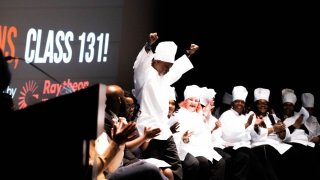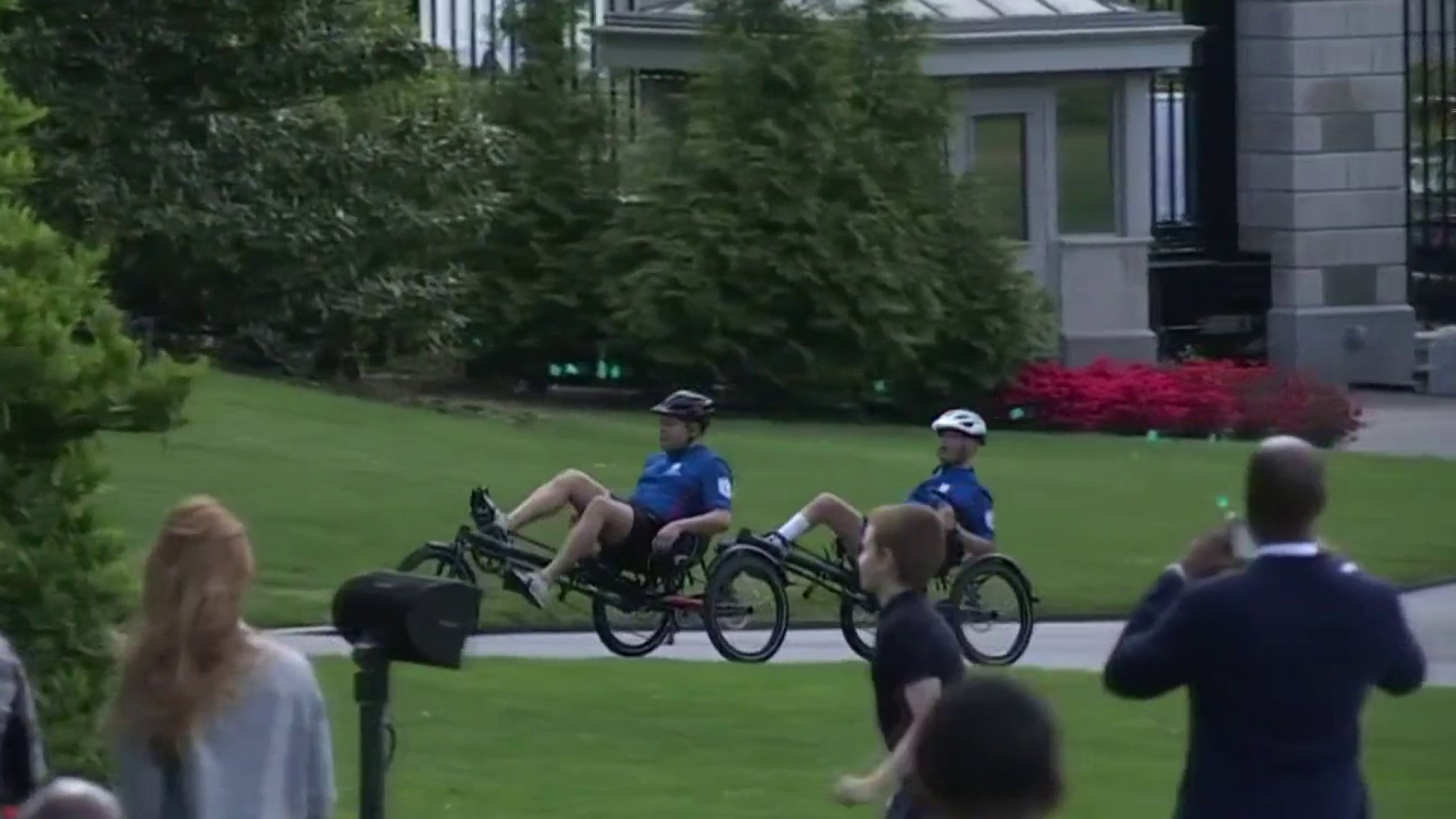
Gregory Lilly felt ill-equipped to be a contributing member of society after 18 1/2 years of incarceration, but he knew he had a love and an aptitude for cooking, and his parole officer encouraged him to apply to DC Central Kitchen's Culinary Job Training Program (CJT).
It ended up changing his life.
Lilly, who is DCCK’s culinary job training recruitment and intake specialist, enrolled in CJT in 2014 after his release from prison. He was determined to use his talents and not go back to prison.
“Coming through the [CJT] program kind of really reinforced my purpose, my whole mission and my whole purpose of coming out of prison,” he said.
We're making it easier for you to find stories that matter with our new newsletter — The 4Front. Sign up here and get news that is important for you to your inbox.
Lilly’s passion for cooking and his eagerness to better himself and those around him were fostered through CJT, where he trained in culinary arts and accessed career resources.
CJT is a 12-week program for adults who have faced past struggles such as incarceration, homelessness, addiction and trauma. Since it started over 30 years ago, more than 2,000 men and women have completed the program and moved on to restaurant-industry jobs in partner companies such as Marriot and Starbucks.
In CJT, people learn the necessary skills and knowledge to work in a kitchen. Food preparation, knife safety, a variety of recipes and a ServSafe certification are all part of the curriculum.
Local
Washington, D.C., Maryland and Virginia local news, events and information
Along with culinary arts education, the program provides career-readiness training and internship placements for students.
Ultimately, Lilly went from a CJT graduate to a leadership position that allows him to recruit people to the program. He finds people who struggled in situations that he was once in and gives them an opportunity to change themselves and their lives.
The work doesn’t stop there: Lilly continuously follows up with CJT graduates, checking in to see that they have stable housing, employment and other resources.
His goal is to use food for social change.
“I think that DC Central Kitchen combines all the aspects of the things that I love to do, which was cooking,” Lilly said. “Well, not just cooking, but using food as a tool for social change and just being able to be in the community and actually be alongside men and women who have similar stories, or who may have a different story.”
One of the people with a different story is Ablawa Ajavon, who lovingly goes by “Chef Mimi” at DCCK.
Ajavon came to the United States from Benin in 2007 with no family except her then-husband. She was supporting herself entirely on her own.
She applied to CJT while going through a divorce and needing another work opportunity.
“It was the best decision I’ve ever made in my life,” she said. “Here, I love what I’m doing. I went through the same program and saw the impact that it had on me, and for me to make the same impact on somebody else … I have a passion for that.”
After completing the CJT program, Ajavon was promoted to culinary instructor. She gets to lead recipe demonstrations at stores participating in DCCK’s Healthy Corners program as well as instruct current CJT members, which she finds extremely rewarding.
“People come from different backgrounds, and people come in with some type of trauma,” she said. “If you don’t have a passion for what you’re doing and [can’t] be patient, then you won’t be able to teach them. I’m very patient with them and I am passionate about what I’m doing … I always find a way to be able to teach them, and that’s what I love.”
Stories like Lilly’s and Ajavon’s aren’t unusual at DCCK. The program is about much more than teaching people how to cook and giving them employment, Lilly said. Much of the instruction also focuses on building self-worth and using food as a tool to heal communities.
This is a larger focus of Lilly's passion for using food for social change. Food, he said, unites people of all cultures and backgrounds. When food isn’t available, such as in food deserts in the District, it perpetuates all other systemic issues—lack of nutritious food worsens crime, poverty and homelessness as people cannot afford to feed themselves, he said.
That’s why food can be used as a tool to heal communities:
“It's basically being able to not only provide meals, but to also provide a lifestyle, a support system and a culture,” Lilly said. “Now, you're starting to talk about breaking societal problems and beginning to empower whole communities of people.”
Themes of empowerment and healing are evident throughout staff and students at DCCK. Even from an administrative standpoint, staff are aware of how their work can ultimately change the lives of individuals:
“What I do every day is amazing and impactful,” said Ja’Sent Brown, chief impact officer of DCCK. “I’m blessed to be part of an organization that has these touchpoints to really welcome people who are ready for a change in their life, to say, ‘Hey, you have a place here, you have a home here, you’re welcome here, and we’re gonna give you that push to get you where you wanna be so that you can truly empower yourself and change the life trajectory of you and your family.’”
In addition to the community impact DCCK has, Brown also spoke about future plans, including a brand-new facility in Southwest D.C. This, she said, is an extremely exciting expansion that will introduce more space and a better location for the CJT training program.
Part of Brown’s role is to work with different departments to recruit people to the program. Those who complete CJT are celebrated with a graduation ceremony. The most recent class, Class 131, had its ceremony Oct. 28.
The ceremony started with a standing ovation: Audience members, friends and family stood and clapped along to music as the graduates marched in. The program included class highlights, an alumni speaker, a keynote speaker and a speech from a class representative. Throughout the ceremony, speakers and graduates expressed emotions of intense gratitude and pride.

The passion CJT graduates have for change and trust in the process was evident in the administrative members of DCCK as well. The mindset is strong in each member of the organization, which speakers expressed throughout the ceremony.
DCCK CEO Michael F. Curtin Jr. gave thanks to the partners and community members that contribute to the meal services and programs DCCK provides, highlighting that over 8 million meals were given to the community during the pandemic. Keynote speaker LaWanda Scott, associate director of Raytheon Technologies, encouraged everyone to take advantage of the opportunities they’re provided in life, citing her own life as an example.
She spoke of the culture and community she’s seen and helped build.
“Like family, we push one another to do what’s best,” she said.

Many graduates come from unstable situations. In addition to the resources DCCK provides them, they have to hold themselves accountable, show up each day and work hard to pass their certifications. Not everyone passes the program, for a variety of reasons. A memorial chair was decorated at the end of the graduates’ row, decorated with flowers to commemorate those who weren’t able to graduate.
As graduates were announced, heavy clapping and cheering followed each name. Class 131 had 15 graduates, who wore white chef uniforms with their names stitched on the upper-left side.
Class 131’s representative, Alvin Smith (called “Big Al” by members of the program), announced his immense pride in the program and the people involved during his speech. He acknowledged all the obstacles that he and his classmates faced, calling his graduation an “achievement of personal skills and accountability.”
What kept him going each day, he said, was gratitude for the resources, opportunity and achievement that CJT had helped him reach.
“Every morning before going to program, I ask for prosperity and good health from God,” he said. “As I look around, I am thankful that my prayers have been answered.”



